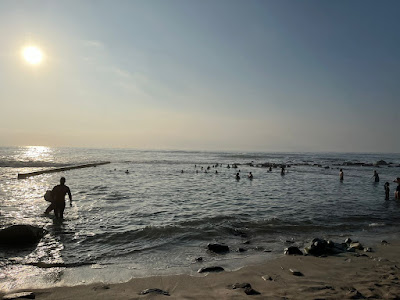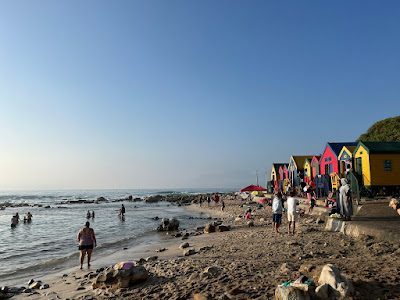Dress rehearsing joy
It's not possible to constantly hone on the crisis; you have to have the love and you have to have the magic. That's also life.
Ndikhule sisokola ekhaya. There! I said it. Which is to say I grew up dress rehearsing tragedy. Lately I've felt the need to write more about my childhood (see previous post, "Everytime it rains"). In the past, writing and talking about my childhood felt like giving into poverty porn and exposure because of all the consequences of being poor. Even while ndikhule sisokola, it wasn't within a politicisation about siyi-working klas ekhaya because I remembered a time when we weren't poor. Or perhaps we didn't seem poor. There were always stories and pictures: mama as a teacher and Tata as a clerk. We moved to the burbs in 1994 and we were well on our way to being South Africa's emerging black middle class; except it wasn't emerging because there's a history of black middle classness which I have seen in the images of my maternal great-grandparents.
Once upon a time my dad had the kind of work where he wore cuff links and tie pins, wore suits and carried a brief case. But slowly things began to change and each eviction made it very clear we were becoming working class. But within this experience, we had middle class sensibilities. My sister and I have often joked about being working class snobs. It didn't help that we went to a public girls' school which masqueraded as a private girls' school (story for another day). Much has been said about people rising out of poverty but the reserve is seldom equally scrutinised. And perhaps it is this weird silencing of this experience that has me reflecting a lot lately about my relationship with the sense of 'making it out of poverty'.
I know all about resilience and survival. I know all about how to develop an edge as an eleven year old. I know all the tricks about making sure intlupheko yam ingabhalwa kum. Kulomama kwakuthungwa (kusathungwa nangoku: EmaBheleni VG Mashologu Dressmakers, eMthini, Buffalo Street). Ndikhule umama esifundisa iindlela zokuba singabhaqwa ukuba siyasokola. Mama used to sew and make us beautiful clothes (this is why I have a tailor to this day; story for another day); so no-one knew the extent of our poverty by simply looking at us. But the mask was always precarious. Especially because we went to a school that had a disdain for poverty. And yet, on the other hand, walking around town wearing a green blazer and brown shoes meant that the world read me as a middle-class, English-speaking, suburban-living little girl. And I played my part.
If I had told people that I know what it means to sleep in an abandoned building eSouthernwood, they would have never believed me. If I had told people that I have an intimacy with homelessness, they would have never believed me. If I had told people I know what it's like to live ematyotyombeni eZiphunzane, they would never believe me. When I tell people that the scars on my hand are from a violent attempted mugging eZiphunzane on my 18th birthday, I suspect they don't believe me.
Even while I was buffered by school and church in my childhood (the perfect colonial subject) I have lived with the consequences of growing up within this hybrid experience of rich and poor, having and not having. My sister and I (whom I shared my experiences with during this period) carry many secrets from this phase of our lives. Some of the experiences were so traumatic our brains have protected us by forgetting. Imagine that: the body is designed to help us forget so we can keep living.
And now as an adult whose life does not reflect anything from my childhood, I am learning to live a life that is marked by a different hybridity. The poverty still exists in weird ways. But by and large, I made it out. But there's a precarity that lingers with reminders that I didn't make it out wholly because there are other households that depend on my salary. We didn't all make it out. And I live in a world where inequality is rising.
While I am no longer swallowed up by poverty, I have a different kind of burden: learning to live with the knowledge that abundance is possible and it is systemic. I have always been irked by that nonsense about "poverty mentality" but if it is true, then there must be a flipside: an abundance/wealth mentality. A belief that there is plenty in the world and that we are deserving of it. And if poverty creates a poverty mentality, how does one develop an abundance mentality? This is not simply self-help nonsense but a thinking aloud about how to make sense of a world that feels unfamiliar to me as I have grown up. When I was in varsity, a friend and I started sharing our life stories and we recognised so many similarities and she became a kindred spirit. We would reflect often about our milestones when we recognised the practical things that marked that we were no longer poor: buying toiletries! When we were poor toiletries were the basics and cost below R100. When we started making money toiletries all of a sudden could be R250! (an aside: that same friend is a trailblazer in her field and slays dragons from time to time!) This seems like a minor anecdote but I have plenty examples of realising the small and big shifts about how money has changed how I live in the world.
But back to poverty!
One of the tools of poverty is dress rehearsing tragedy. Because everything feels so out of control when you're poor, terrible things happen all the time. The systemics of poverty mean that a simple and natural occurrence like rain can turn into a flooding because of bad infrastructure. There are many examples of this daily grind: going to the toilet ematyotyombeni can turn into a dehumanising experience because communal toilets ematyotyombeni are vile (and deathly in the case of Michael Kompape who drowned in a pit latrine esikolweni). There's nothing like smelling shit all the time; especially in summer (this is why I have a poem titled "Ikaka" in Ilifa; it's very personal).
So from a young age, I learned to hustle and find ways of protecting my own dignity. Spirituality became the bedrock of building and sustaining that dignity. It's hard to explain the connection between prayer and the systemics of poverty, especially in a context where so many poor people are religious/spiritual and yet their poverty is enduring. But this is not what this essay is about because that needs more time to reflect upon. There were many times in my childhood where I prayed for things to change and they didn't; instead they got worse. I thought I would occupy this liminal space of poor-but-not-quite for the rest of my life.
But things did get better and the past decade has been a reckoning with this new reality. Even as I write this essay I am skirting around what I mean. In simple terms: I'm not poor. I have a job (in a context where unemployment is a reality for many young people), I have savings, I have enough money to share with my family, I can choose to use public transport because I have a car. I can control my life. And yes, much of this financial freedom is because I do not have children. And no, I am not the rich aunty!
In the past few years, many of the tools of poverty have become useless. And I have felt the anxiety of losing my street-cred. When I was 11 years old one of my teachers made it her job to ask me every time she saw me why I was scowling. This manifested as a tension in the skin above my eyes. I was stressed as a child. This aged me. This is one symptom of poverty, it ages children. And now, all I seem to hear is how young I look. I am no longer scowling (though I do have a mean resting bitch face). I attribute this to a change in lifestyle which is enabled by the fact that I live well. I have had to train myself out of dress rehearsing tragedy.
I now dress rehearse joy, blessings, soft things. But it feels like an active process. I have a myriad of mantras I have to repeat to myself to remind myself that it is good and it is true: I have a beautiful life.
 |
| St Jame's Tidal Pool |
I began writing this essay while sitting at the St James tidal pool where I sometimes do my morning pages. St James is a five minute drive from where I live. That's where most of my days begin. In the ocean. I have developed the ability to have a sense of time and leisure, to map out my day in a way that suits me. There's a direct correlation between poverty and how time feels like it's been stolen (mostly by the hustle). I have often heard myself reflect with a friend how spacious my days feel. I can do a lot mostly because I can take my time and work at my own pace (despite other schedules where there are meetings and workshops and deadlines which I know how to work with and around). Poverty steals time and joy.
Writing this essay has been an act of savouring. To allow myself to say ndisuka kude. It's okay for me to do my morning pages elwandle. And take my time.
And yet, from time to time, I have to suspend the thoughts about the collective activism to end poverty's injustices. And then I have to reckon with some of that guilt. Survivor's guilt perhaps. I am learning to allow myself simple joys of being in the sun, frolicking in the water (before I encounter emails, sometimes working from home, which I love).
One day I might write a longer piece about the joy toolkit. Maybe when I no longer feel like I am in the learning phase. But I'm already pre-empting whether that would mean I am taking the goodness for granted. But for now, I know that gratitude is the mainstay of the joy toolkit. It seems too simple but somehow it has changed the texture of my life.
Photo credit: Chris McConnachie



Comments